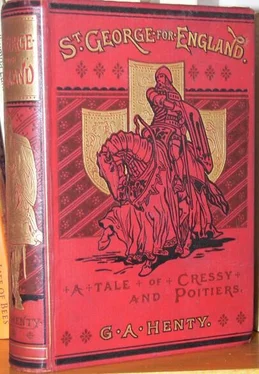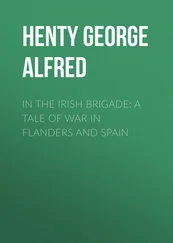G. Henty - St. George for England - A Tale of Cressy and Poitiers
Здесь есть возможность читать онлайн «G. Henty - St. George for England - A Tale of Cressy and Poitiers» весь текст электронной книги совершенно бесплатно (целиком полную версию без сокращений). В некоторых случаях можно слушать аудио, скачать через торрент в формате fb2 и присутствует краткое содержание. Жанр: Старинная литература, на английском языке. Описание произведения, (предисловие) а так же отзывы посетителей доступны на портале библиотеки ЛибКат.
- Название:St. George for England: A Tale of Cressy and Poitiers
- Автор:
- Жанр:
- Год:неизвестен
- ISBN:нет данных
- Рейтинг книги:3 / 5. Голосов: 1
-
Избранное:Добавить в избранное
- Отзывы:
-
Ваша оценка:
- 60
- 1
- 2
- 3
- 4
- 5
St. George for England: A Tale of Cressy and Poitiers: краткое содержание, описание и аннотация
Предлагаем к чтению аннотацию, описание, краткое содержание или предисловие (зависит от того, что написал сам автор книги «St. George for England: A Tale of Cressy and Poitiers»). Если вы не нашли необходимую информацию о книге — напишите в комментариях, мы постараемся отыскать её.
St. George for England: A Tale of Cressy and Poitiers — читать онлайн бесплатно полную книгу (весь текст) целиком
Ниже представлен текст книги, разбитый по страницам. Система сохранения места последней прочитанной страницы, позволяет с удобством читать онлайн бесплатно книгу «St. George for England: A Tale of Cressy and Poitiers», без необходимости каждый раз заново искать на чём Вы остановились. Поставьте закладку, и сможете в любой момент перейти на страницу, на которой закончили чтение.
Интервал:
Закладка:
The Genoese had marched four leagues beneath a hot sun loaded with their armor and heavy cross-bows, and they remonstrated against the order, urging that they were in no condition to do good service without some repose. The Count D'Alençon, furious at their hesitation, ordered them up, but as they advanced a terrible thunderstorm, with torrents of rain, broke over the armies, and wetting the cords of the cross-bows rendered many of them unserviceable. At length the cross-bowmen were arranged in front, while behind them were the vast body of French cavalry, and the order was given for the battle to begin.
The Genoese advanced with loud shouts, but the English archers paid no attention to the noise, but waited calmly for the attack. At this moment the sun, now approaching the west, shone out brightly between the clouds behind the English, its rays streaming full in the faces of the French. The Genoese were now within distance, and began to discharge their quarrels at their impassive enemies, but as they opened fire the English archers drew their bows from the cases which had protected them from the rain, and stepping forward poured their arrows among the Genoese. The cross-bowmen were smitten as with a storm, numbers were struck in the face and other unprotected parts, and they were instantly thrown into confusion, and casting away their cross-bows they recoiled in disorder among the horsemen behind them.
Philip, passionate and cruel as ever, instead of trying to rally the Genoese, ordered the cavalry behind them to fall upon them, and the men-at-arms at once plunged in among the disordered mass of the cross-bowmen, and a wild scene of carnage and confusion ensued, the English archers continuing to pour their unerring arrows into the midst. The Count D'Alençon, who was behind, separated his division into two bodies, and swept round on one side himself, while the Count of Flanders did the same on the other to attack the Prince of Wales in more regular array. Taking a circuitous route, D'Alençon appeared upon a rising ground on the flank of the archers of the Black Prince, and thus, avoiding their arrows, charged down with his cavalry upon the eight hundred men-at-arms gathered round the Black Prince, while the Count of Flanders attacked on the other flank.
Nobly did the flower of English chivalry withstand the shock of the French, and the prince himself and the highest nobles and simple men-at-arms fought side by side. None gave way a foot.
In vain the French, with impetuous charges, strove to break through the mass of steel. The spear-heads were cleft off with sword and battle-ax, and again and again men and horses recoiled from the unbroken line. Each time the French retired the English ranks were formed anew, and as attack followed attack a pile of dead rose around them. The Count D'Alençon and the Duke of Lorraine were among the first who fell. The young Count of Blois, finding that he could not ride through the wall of steel, dismounted with his knights and fought his way on foot toward the banner of the Prince of Wales. For a time the struggle was desperate, and the young prince, with his household knights, was for a time well-nigh beaten back.
Walter, fighting close beside the prince, parried more than one blow intended for him, and the prince himself slew the Count of Blois, whose followers all fell around him. The Count of Flanders was also slain, and confusion began to reign among the assailants, whose leaders had now all fallen. Philip himself strove to advance with his division into the fight, but the struggle between the Genoese and the men-at-arms was still continuing, and the very multitude of his troops in the narrow and difficult field which the English had chosen for the battle embarrassed his movements.
Charles of Luxembourg, King of the Romans, and afterward Emperor of Germany, son of the old King of Bohemia, with a large body of German and French cavalry, now assailed the English archers, and in spite of their flights of arrows came to close quarters, and cutting their way through them joined in the assault upon the men-at-arms of the Black Prince. Nearly forty thousand men were now pressing round the little body, and the Earls of Northampton and Arundel moved forward with their divisions to his support, while the Earl of Warwick, who was with the prince, dispatched Sir Thomas of Norwich to the king, who still remained with his powerful reserve, to ask for aid.
"Sir Thomas," demanded the king, "is my son killed, overthrown, or wounded beyond help?"
"Not so, sire," replied the knight, "but he is in a rude fight, and much needs your aid."
"Go back, Sir Thomas, to those who sent you, and tell them from me that whatsoever happens they require no aid from me so long as my son is in life. Tell them also that I command them to let the boy win his spurs, for, God willing, the day shall be his, and the honor shall rest with him and those into whose charge I have given him."
The prince and those around him were filled with fresh ardor when they received this message. Each man redoubled his efforts to repel the forces that were incessantly poured down upon them by the French. On all sides these pressed around them, striving desperately, but ever in vain, to break through the solid ranks of the English. The French men-at-arms suffered, moreover, terribly from the attacks of the Welsh infantry. These men, clad in thick leather jerkins, nimble of foot, accustomed to a life of activity, were armed with shortened lances and knives, and mingled fearlessly among the confused mass of French cavalry, creeping beneath the horses' bellies, standing up when they got a chance, and stabbing horses and men with their knives and pikes. Many were trampled upon or struck down, but numbering, as they did, six thousand, they pervaded the whole mass of the enemy, and did terrible execution, adding in no small degree to the confusion caused by the shower of arrows from the archers within the circle of the men-at-arms. The instant a French knight fell, struck from his horse with a battle-ax or arrow, or by the fall of a wounded steed, the half-wild Welsh were upon him and slew him before he could regain his feet.
The slaughter was immense. The Count of Harcourt, with his nephew the Count D'Aumale and his two gallant sons, fell together, and at last Charles of Luxembourg, seeing his banner down, his troops routed, his friends slain, and the day irreparably lost, and being himself severely wounded in three places, turned his horse and fled, casting off his rich emblazoned surcoat to avoid recognition. In the mean time Prince Charles' father, the veteran King of Bohemia, once one of the most famous warriors of Europe, but now old and blind, sat on horseback at a little distance from the fight; the knights around him told him the events as they happened, and the old monarch soon saw that the day was lost. He asked them for tidings of his son Charles of Luxembourg, but they were forced to reply that the banner of the King of the Romans was no longer in sight, but that, doubtless, he was somewhere engaged in the mêlée .
"Lords," said the old man, "you are my vassals, my friends, and my companions, and on this day I command and beseech you to lead me forward so far that I may deal one blow of my sword in the battle."
His faithful friends obeyed him, a number of knights arranged themselves around him, and lest they should lose him in the fight they tied their horses together by the bridles and charged down into the fray. Advancing directly against the banner of the Prince of Wales, the blind monarch was carried into the midst of the thickest strife. There the little group of knights fought gallantly, and after the battle was over the bodies of the king and his friends were found lying together, their dead horses still linked by the bridles.
During this terrible battle, which had been raging since three o'clock, Philip had made strenuous efforts to aid his troops engaged in the front by continually sending fresh bodies to the assault. It was now growing dark, terror and confusion had already spread among the French, and many were flying in all directions, and the unremitting showers of English arrows still flew like hail among their ranks. As the king made his way forward, surrounded by his personal attendants, to take part himself in the fight, his followers fell thick around him, and his horse was slain by an arrow. John of Hainault, who had remained by his side during the whole day, mounted him upon a fresh horse and urged him to fly, as the day was lost. Philip, however, persisted, and made his way into the mêlée , where he fought for some time with extreme courage, until almost all around him were slain, the royal standard-bearer killed, and himself wounded in two places. John of Hainault then seized his bridle, exclaiming, "Come away, sire, it is full time; do not throw your life away foolishly; if you have lost this day you will win another," and so almost forced the unwilling king from the field. Philip, accompanied by the lords of Montmorency, Beaujeu, Aubigny, and Mansault, with John of Hainault and sixty men-at-arms, rode to the Castle of Broye, and there halted for a few hours. At midnight he again set out, and in the morning arrived safely at Amiens.
Читать дальшеИнтервал:
Закладка:
Похожие книги на «St. George for England: A Tale of Cressy and Poitiers»
Представляем Вашему вниманию похожие книги на «St. George for England: A Tale of Cressy and Poitiers» списком для выбора. Мы отобрали схожую по названию и смыслу литературу в надежде предоставить читателям больше вариантов отыскать новые, интересные, ещё непрочитанные произведения.
Обсуждение, отзывы о книге «St. George for England: A Tale of Cressy and Poitiers» и просто собственные мнения читателей. Оставьте ваши комментарии, напишите, что Вы думаете о произведении, его смысле или главных героях. Укажите что конкретно понравилось, а что нет, и почему Вы так считаете.












